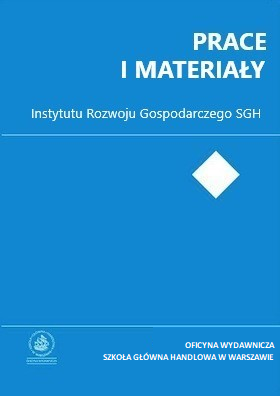Deficyt demokracji w Unii Europejskiej a deficyt wdrażania polityki
##plugins.themes.bootstrap3.article.main##
Abstrakt
Jednym z zarzutów kierowanym pod adresem Unii Europejskiej jest istnienie tzw. deficytu demokracji. Wśród naukowców nie ma jednak zgody nie tylko co do skali tego zjawiska, ale też co do jego rzeczywistego występowania. Wynika to z różnego postrzegania istoty tego ugrupowania, które wykracza poza tradycyjną współpracę międzyrządową i jednocześnie nie spełnia warunków stawianych demokratycznym państwom. Deficyt demokracji jest łączony z deficytem wdrażania polityki. Zaczął być on dostrzegany wraz z wprowadzeniem programu jednolitego rynku, zakładającego m.in. stworzenie równych warunków konkurencji dla podmiotów gospodarczych na rynku europejskim. Dążenie do deregulacji i liberalizacji gospodarek ujawniało postawy antyrynkowe rządów. Jednocześnie można było obserwować narastanie napięć w państwach członkowskich i niski poziom społecznej akceptacji dla działań podejmowanych na szczeblu tego ugrupowania. Pomimo wielu teorii, prac i dyskusji nie udało się dotychczas znaleźć nie budzącego kontrowersji rozwiązania problemu legitymacji demokratycznej i związanego z nim deficytu wdrażania polityki. Doświadczenia ostatnich lat, które pokazują, że rządy bez względu na to jak bardzo utożsamiają się z ideami zjednoczonej Europy reprezentują przede wszystkim interesy swoich państw, jak też wprowadzane zmiany w zakresie sposobów integrowania polityki, wydają się potwierdzać tezę mówiącą o pewnym zwrocie w kierunku międzyrządowego modelu integracji gospodarczej. (abstrakt oryginalny)
##plugins.themes.bootstrap3.article.details##
Bibliografia
An Agenda for a growing Europe. Making the UE Economic System Deliver, Report of an Independent High-Level Study Group established on the initiative of the President of the European Commission, July 2003.
Celiński A., Lex, –kracja i demos. Rzecz o deficycie demokracji w UE, http//www.knsp.uksw.edu.pl/artykuly/deficyt_ac.pdf Chryssochoou D. N., Demokracja Unii Europejskiej i jej deficyt, w: Unia Europejska, organizacja i funkcjonowanie, red. nauk. M. Cini, Polskie Wydawnictwo Ekonomiczne, Warszawa 2007.
Ciechański J., Otwarta metoda koordynacji w Unii Europejskiej. Wpływ na politykę społeczną i zatrudnienia nowych państw członkowskich, Scholar 2003.
Cini M., Wdrażanie polityki europejskiej, w: Unia Europejska, organizacja i funkcjonowanie, red. nauk. M. Cini, Polskie Wydawnictwo Ekonomiczne, Warszawa 2007.
Dehousse R., The Open Method of Coordination: A new Policy Paradigm?, Paper presented at the First Pan-European Conference on European Union Politics “The Politics of European Integration: Academic Acquis and Future Challenges”, Bordeaux, 26-28 September 2002.
Follesdal A. and Hix S., Why There is a Democratic Deficit in the UE: A Response to Majone and Moravcsik, “European Governance Papers”, No. C-05-02.
Grosse T.G., Deficyt demokratyczny w Unii Europejskiej i metody jego przezwyciężania, w: Deficyt demokracji w Unii Europejskiej a europejskie grupy interesów, red. U. Kurczewska, Wydawnictwa Uniwersytetu Warszawskiego, Warszawa 2008.
Jesień L., Otwarta metoda koordynacji, jej kontekst europejski i znaczenie dla Polski (Załącznik 1.), w: Polska wobec Strategii Lizbońskiej, Biała Księga Polskiego Forum Strategii Lizbońskiej, Gdańsk – Warszawa 2003.
Junge K., Integracja zróżnicowana, w: Unia Europejska, organizacja i funkcjonowanie, red. nauk. M. Cini, Polskie Wydawnictwo Ekonomiczne, Warszawa 2007.
Klaus K., Pojęcie i źródła deficytu demokracji w UE, w: „Studia Europejskie” 2004, nr 2.
Krzemiński I., Unia Europejska, demokracja i kryzys, http://www.liberte.pl/kraj/174- unia-europejska-demokracja-i-kryzys-.pdf
Milev M., A ‘Democratic Deficit’ in the European Union?, Étude, http://www.geopolitis.net/EUROPE%20EN%20FORMATION/Democratic%20Defi cit%20in%20the%20European%20Union.pdf
Zeitlin J., Introduction: The Open Method of Coordination in Question, w: The Open Method of Coordination in Action: The European Employment and Social Inclusion Strategies, P.I.E. – Peter Lang, 2005.
